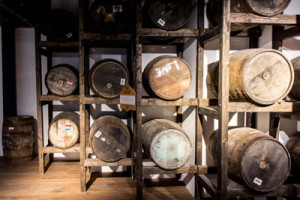
The distillery of Cape May Whiskey must have spent too much money on the valuable barrel on exhibit at Rosenburg’s Grocery in Greenville, Texas in 1898. No photograph of the distillery, the bottles, or barrels could be found. Something tells me the one at Rosenburg’s was probably much more elegant, but these will give you a hint.
Since I spend an inordinate amount of time reading old newspapers, scanning the ads, and catching up on the local gossip of a century ago, I would like to share some of my favorites finds. Newspapers from 19th century Greenville are scarce but those available are treasures.
The year 1898 was the end of a financial recession that began in 1893. Many historians consider it as disastrous as the Great Depression of the 1930s. By the fall of 1898 the economy was more stable and citizens were losing their belts, so to speak. That year money began to flow again across the Blackland Prairie.
The Greenville Messenger was the newsiest of all local newspapers. In October of that month, the Messenger reported the most handsome and valuable barrel ever seen in Greenville on display at H. Rosenburg’s grocery store. Described as a monster, some six feet long, painted pure white with hoops of gold, it held 135 gallons of Rosenberg’s premier world-renown “Cape May” whisky made in Nelson County, Kentucky. The valuable barrel weighed 1250 pounds and was valued at $550.
Another item in the Messenger earlier the same month may have encouraged Mr. Rosenburg to purchase the expensive barrel of whisky. Coal was discovered near Campbell. For years supporters of both Greenville and Hunt County just knew there was valuable minerals beneath the black soil. Now expert miners located a vein on land owned by D. S. Finger. The owner was informed that he sat on a valuable piece of coal mining property. Very little additional news about the possible coal mine appeared in later editions of the Messenger, though.
Evidently Mr. Rosenburg and the editor of the newspaper were great friends. Or at least Mr. Rosenburg got as much free print and he paid for in advertisements. In the summer one of the biggest pumpkins ever raised in the area was on exhibition in Rosenburg’s grocery store. Bob Mansfield, who lived on a farm two miles west of Quinlan, brought the 63-pound squash into town. However, I have a few questions about this giant gourd. Pumpkins are usually planted in mid-summer and not harvested until frost. So why did it arrive in Greenville in mid-July? I did learn that a 63-pound vegetable was a mere weakling. In 2009 a 1,900-pound pumpkin grown in a temperature controlled glass pavilion north of Boston set off a race for much larger pumpkins. Maybe Mr. Mansfield harvested his crop too soon.
Meanwhile an incident in Wolfe City almost left a man without his precious gold watch. Fritz Fiege filed an affidavit against saloonkeeper Robert Wesley, charging him with robbery of the watch. Mr. Fiege visited the saloon, and after a bit began to nod in his chair. Wesley offered him a bed where Fiege lay down and slept. When he awoke he discovered his gold watch missing. Mr. Wesley produced the watch, saying he found it in the backyard where Fiege must have dropped it. No further information found its way into the Messenger.
